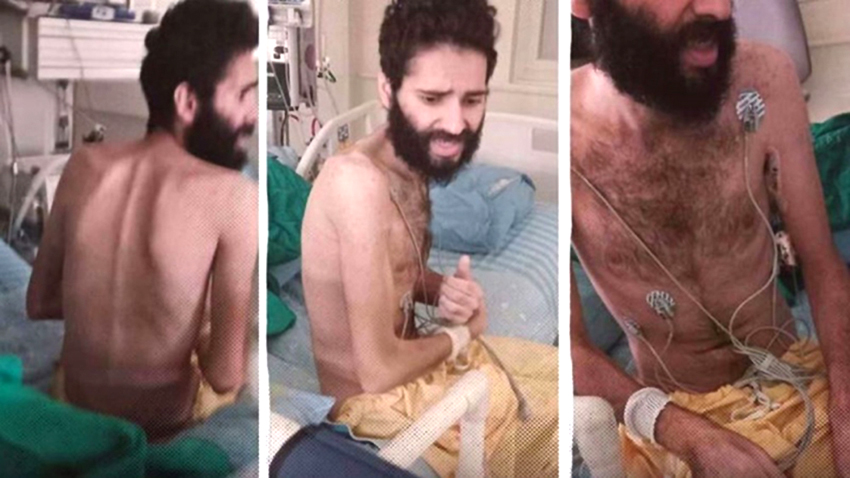
Palestinian hunger-striker Miqdad al-Qawasmeh, who had refused to take his meals for 112 days, has won his struggle against Israeli prison authorities, who have agreed to free him next February.
The director of the Prisoners Information Office on Thursday said al-Qawasmeh ended his hunger strike after Israel agreed to release him next February.
The victory came after rounds of dialogue waged by the supreme leadership body of Hamas prisoners.’
Nahid added that the head of the supreme leadership committee for Hamas prisoners, Salama al-Qatawi, and the body’s foreign affairs official, Musab Abu Shkhaydam, met the heroic prisoner Miqdad al-Qawasmi yesterday.
Al-Qawasmeh ‘can’t move even in a wheelchair’ due to his alarming health condition his lawyer says.
Jawad Boulos said that al-Qawasmeh’s immobility refutes claims by Israeli authorities that his health had improved.
Boulos also said that the prison administration had refused to let him see Qawasmeh during his visit to the prison as his health condition is alarming.
Qawasmeh, who has serious complications in his lungs, kidney, and liver, went on hunger strike to protest Israel’s illegal administrative detention policy, which allows the regime to hold prisoners for long periods of time without charge or trial.
He has been in administrative detention, with no trial or charge, since January.
Last week, Israeli authorities transferred Qawasmeh from Kaplan Hospital to Ramla prison hospital, claiming that his health had improved, in a move to pressure the inmate to break his strike.
Thousands of Palestinian prisoners reject meals in solidarity with six fellow hunger-striker inmates
There are also five other Palestinians prisoners who have been on hunger strike in protest at their administrative detention.
Kayed al-Fasfous has been on hunger strike for 119 days, the longest strike among the six. The other prisoners are Alaa Aaraj (95 days), Hesham Abu Hawwash (85 days), Ayyad Hureimi (49 days) and Lo’ai al-Ashqar (31 days).
The Palestinian Authority (PA)’s Commission of Detainees and Ex-Detainees Affairs said on Sunday that Fasfous’s health condition is extremely critical and that he might die at any moment.
The commission, citing one of its lawyers, also said on Wednesday that 34-year-old Hureimi was recently transferred from Ramla prison to Ofer prison, where he is currently being held in a cell infested with cockroaches .
Hureimi has not been provided with any vitamin supplements and medical examinations since he started his hunger strike.
The lawyer, who visited Hureimi recently, added that the inmate’s health condition worsened as he began to suffer from extensive pain, blurred vision, and that he could no longer stand or walk.
Hureimi’s administrative detention began in April, but an Israeli military court recently extended it for another four months after he completed his previous one. He has spent nine years in Israeli jails.
The six Palestinian hunger strikers have been demanding an end to their administrative detention based on a ‘secret file,’ which even their lawyers are not allowed to view.
The files are provided by the Israeli intelligence service and are renewed successively.
More than 7,000 Palestinians are held in Israeli jails. Hundreds of them under administrative detention.
Some Palestinian prisoners have been held in administrative detention for up to 11 years.
Palestinian inmates regularly stage hunger strike in protest at the administrative detention policy and harsh conditions in Israeli jails.
Over a dozen Palestinian lawmakers and nearly 20 journalists are also held in Israeli detention centers, several of them under the administrative detention policy.
In 2015, Israel approved a law that authorises force-feeding the Palestinian prisoners on hunger strike, a practice rejected by the United Nations (UN) as a violation of human rights.
Meanwhile, Palestinians throughout the West Bank rallied on Thursday marking the 17th anniversary of the death of Yasser Arafat, the first president of Palestine and chairman of the Palestine Liberation Organisation (PLO).
The event took place at the Arafat Mausoleum in Ramallah, where hundreds of people, waving yellow Fatah and Palestinian flags and holding posters of Arafat, to honour him.
Also in Ramallah, young Palestinians clashed with Israeli soldiers at the northern entrance to the city.
The soldiers fired teargas and rubber bullets at them.
West Bank schools devoted the first hour of school to talk about the biography of the late president and his role in reviving the Palestinian cause internationally.
In the southern West Bank, Israeli soldiers violently cracked down on a students’ rally in Beit Ummar town, north of Hebron, causing dozens to suffocate from tear gas.
They also broke up a similar rally held by the students of Tareq Bin Ziad Secondary School in the southern part of Hebron city, causing dozens of suffocation cases.
Dozens of other students suffocated as Israeli troops clamped down on a similar rally in Tuqu’ town, southeast of Bethlehem.
In the besieged Gaza Strip, hundreds of Palestinians headed to Arafat’s home, west of Gaza City where he lived with his family from 1994 to 2001.
Mahmoud Abbas today laid a wreath at Yasser Arafat’s Mausoleum in Ramallah, marking the 17th anniversary of the late iconic leader’s death.
In a televised speech on Wednesday, President Abbas said that ‘this anniversary comes and our just national cause is going through a very delicate stage, perhaps the most difficult in our history of struggle.’
‘It is not reasonable or acceptable for the occupation to remain choking us forever, and it is not reasonable for us to remain committed to agreements that Israel does not abide by.’